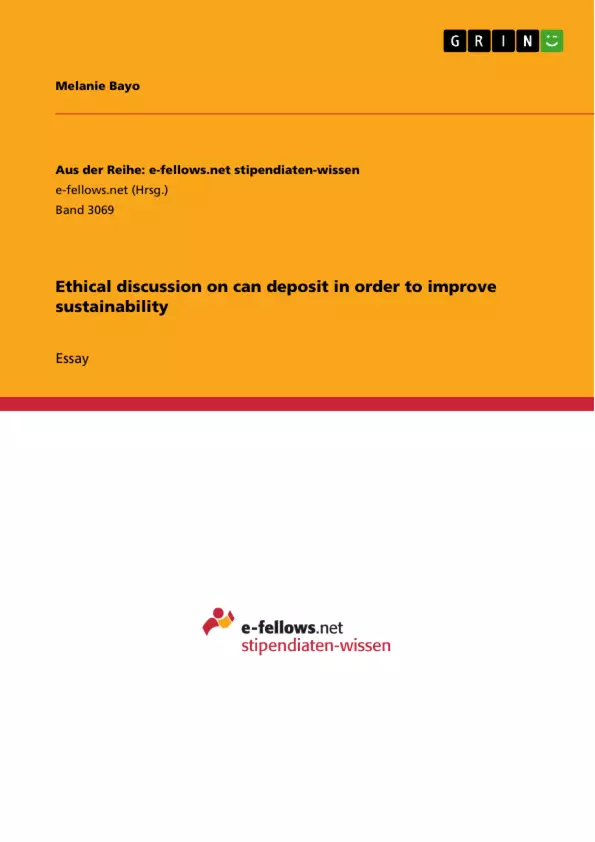This essay ethically discusses the decision of a country (Country A) to introduce a two US-$ can deposit on all plastic bottles sold in order to improve sustainability.
A currently discussed sustainability dilemma is natural resource depletion and environmental pollution through plastic. Since plastic has several fields of use, a lot of crude oil is extracted. As products made of plastic usually have a short duration of usage, using plastics is considered to be a waste of resources. Furthermore, plastics are not biodegradable which leads to increasing waste of plastic in the environment. Several measures are undertaken to counter the impacts of plastic, for instance implementing recycling systems or developing alternative packaging.
The opinion held in this paper is that introducing a 2 US-$ deposit in order to improve sustainability is morally wrong from a deontological point of view. First, the introduction of the can deposit limits people’s freedom of choice. Second, the amount of two US-dollars is unjust, considering that some people will not be able to always raise them. Third, sustainability is not addressed appropriately, since sustainability dimensions other than ecology are not well considered.
LIST OF CONTENTS
- Introduction
- Main reasons against a two US‐dollar can deposit
- Main reasons for a two US‐dollar can deposit
- Ethical analysis
- Freedom of choice and freedom of markets
- Implementing values as a law: Environmental conservation
- Equal opportunities
- Concepts of Sustainability
- Terminology
- Conclusion
Objectives and Key Themes
This essay ethically discusses the decision of a country (Country A) to introduce a two US-dollar can deposit on all plastic bottles sold in order to improve sustainability. The author argues that introducing a two US-dollar deposit in order to improve sustainability is morally wrong from a deontological point of view.
- The introduction of a can deposit limits people’s freedom of choice.
- The amount of two US-dollars is unjust, considering that some people will not be able to always raise them.
- Sustainability is not addressed appropriately, since sustainability dimensions other than ecology are not well considered.
- The can deposit could be understood as means to control excessive extraction of natural resources by a monopoly at a disadvantage of the public good.
- The can deposit could raise general environmental awareness and lead to behaviour change.
Chapter Summaries
The introduction of a two US-dollar can deposit on plastic bottles is examined from both consumer and environmental perspectives. It is argued that the can deposit limits personal freedom of choice and creates an additional cost burden. Conversely, the deposit is seen as a way to reduce environmental pollution and conserve natural resources. The essay then delves into an ethical analysis of the deposit, considering various ethical theories and arguments.
The author explores the concept of freedom of choice and the role of markets in addressing sustainability concerns. They discuss how the can deposit could violate individual freedom of choice and potentially lead to government failures. Utilitarianism, classical economics, behavioural economics, and the role of values in law are all examined in relation to the can deposit.
Furthermore, the essay addresses issues related to equal opportunities, highlighting how the two US-dollar deposit may disadvantage certain groups and questioning its fairness. It also explores the different dimensions of sustainability, drawing on the Brundtland Commission definition and Jonas’ concept of responsibility.
Keywords
This essay focuses on the ethical implications of introducing a two US-dollar can deposit on plastic bottles to improve sustainability. It examines the conflict between individual freedom of choice and environmental conservation, exploring concepts like deontology, utilitarianism, and different perspectives on sustainability.
Frequently Asked Questions
Is the introduction of a 2 US-$ can deposit ethically justified?
The author argues that it is morally wrong from a deontological perspective because it limits individual freedom of choice and imposes an unjust financial burden.
How does the can deposit affect freedom of choice?
It forces consumers into a specific behavior through high financial pressure, which can be seen as an infringement on personal liberty and market freedom.
Why is the deposit amount of two dollars considered unjust?
The high amount may disadvantage low-income groups who cannot afford to pay the upfront deposit, thus violating the principle of equal opportunities.
Does the deposit promote overall sustainability?
The essay argues that while it addresses ecological concerns, it fails to appropriately consider social and economic dimensions of sustainability.
What ethical theories are used to analyze the deposit?
The analysis includes deontology (duty-based ethics), utilitarianism (consequence-based ethics), and Jonas’ concept of responsibility.
- Quote paper
- Melanie Bayo (Author), 2018, Ethical discussion on can deposit in order to improve sustainability, Munich, GRIN Verlag, https://www.grin.com/document/468573



